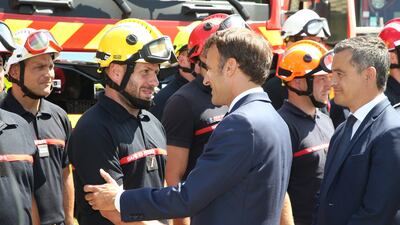Emmanuel Macron pledged to step up the fight against climate change as he visited the site of wildfires which have ripped across France during Europe’s latest heatwave.
The changing climate is leading to more fires and will force France and the European Union to take "structural decisions", President Macron said on Wednesday.
"Great fires are accelerating," he said, citing climate change as the cause.
"(They) will impose us to take structural decisions in... the years to come," he added on a visit to the wine-growing Gironde region, which saw its biggest wildfires in over 30 years, where roughly 20,000 hectares of forests were affected.

Cooler air swept in Wednesday, bringing relief to people in France, as well as Spain and Portugal, countries that have battled blazes for days.
But thousands of firefighters continued to tackle blazes that have broken out in multiple countries after months of drought-like conditions.
Nearly 500 firefighters struggled to contain a large wildfire that threatened hillside suburbs outside Athens for a second day, as fires burnt across a southern area of the continent.
Britain’s record-breaking heatwave spurred calls for the government to speed up efforts to adapt to a changing climate, especially after wildfires created the busiest day for London firefighters since bombs rained down on the city during the Second World War.
London wildfires - in pictures
Even so, travel was disrupted for a third day as rail operators repaired damage caused by the heat, and firefighters continue to mop up hotspots at the scene of Tuesday’s fires.
Britain needs to prepare for similar heatwaves in the future because man-made carbon emissions have already changed the climate, said Professor Stephen Belcher, chief scientist at the Met Office, the UK’s national weather service. Only aggressive emissions reductions will reduce the frequency of such events, he said.
Fifteen fire departments declared major incidents as more than 60 properties around the country were destroyed, Cabinet Office minister Kit Malthouse told the House of Commons on Wednesday.
One of the biggest fires was in Wennington, a village on the eastern outskirts of London, where a row of houses was destroyed by flames that raced through tinder-dry fields nearby. Resident Tim Stock said he and his wife fled after the house next door caught fire and the blaze rapidly spread.
“It was like a war zone,” he said. “Down the actual main road, all the windows had exploded out, all the roofs had caved, it was like a scene from the Blitz.”
Spain counts cost of 'climate emergency
Spain's prime minister said "more than 500 people died" during a 10-day heatwave as Europe counts the cost of a record period of extreme temperatures. Temperatures of more than 40°C (104°F) over previous days have caused misery for millions across the continent and shattered heat records.
Pedro Sanchez said the "climate emergency is a reality".
Speaking against a backdrop of charred trees and burnt ground in the hard-hit north-eastern Zaragoza region, he urged people to take "extreme caution".
Mr Sanchez cited figures released by the Carlos III Health Institute, which estimates the number of heat-related fatalities based on the number of excess deaths compared with the average in previous years.
France must invest more money on fighting wildfires, Agriculture Minister Marc Fesneau said on Wednesday. "We must go further," Mr Fesneau told France 2 Television.
He said the government had already earmarked €850 million ($870m) to upgrade its fleet of fire-fighting planes, as well as €1 billion for re-planting trees.
"We are having to confront a quite exceptional situation, we are talking about more than 20,000 hectares affected in Gironde, 1,500 in Finistere and 1,500 in the Bouches du Rhone," added Mr Fesneau, referring to damage caused in Brittany and southern France.






















